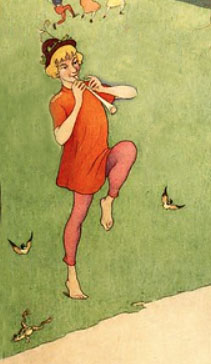Alla fiera di Mastr'Andrè
This song is in the Neapolitan dialect. It can be found as "Alla fiera di Mastro Andrè" and "Alla fiera di Sant' Andrè".

Alla fiera di Mastr'Andrè
At the Fair of Master Andrew
Cumulative Song
Cumulative Song
(Italian Dialect)
(English)
Alla fiera di Mastr'Andrè
Aggio cumprat' 'nu piffariello,
Piripipì lu piffariello
(Ritornello)
Alamirè, alamirè,
Alla fiera di Mastr'Andrè,
Alamirè, alamirè,
Alla fiera di Mastr'Andrè.
Alla fiera di Mastr'Andrè
Aggio cumprat' 'nu tamburiello,
Turututù lu tamburiello
Piripipì lu piffariello
(Ritornello)
Alla fiera di Mastr'Andrè
Aggio cumprat' 'nu viulino,
Piu piu lu viulino
Turututù lu tamburiello
Piripipì lu piffariello
(Ritornello)
Alla fiera di Mastr'Andrè
Aggio cumprat' 'na viola,
Za-zà la viola
Piu piu lu viulino
Turututù lu tamburiello
Piripipì lu piffariello
(Ritornello)
Alla fiera di Mastr'Andrè
Aggio cumprat' 'na trumbetta,
Perepepè fa la trumbetta
Za-zà la viola
Piu piu lu viulino
Turututù lu tamburiello
Piripipì lu piffariello
(Ritornello)
Alla fiera di Mastr'Andrè
Aggio cumprat' 'nu trumbone,
Poropopò fa lu trumbone
Perepepè fa la trumbetta
Za-zà la viola
Piu piu lu viulino
Turututù lu tamburiello
Piripipì lu piffariello
(Ritornello)
Alla fiera di Mastr'Andrè
Aggio cumprat' 'na pistola,
Pam pam la pistola
Poropopò fa lu trumbone
Perepepè fa la trumbetta
Za-zà la viola
Piu piu lu viulino
Turututù lu tamburiello
Piripipì lu piffariello
(Ritornello)
Alla fiera di Mastr'Andrè
Aggio cumprat' 'nu fucile,
Pum pum lu fucile
Pam pam la pistola
Poropopò fa lu trumbone
Perepepè fa la trumbetta
Za-zà la viola
Piu piu lu viulino
Turututù lu tamburiello
Piripipì lu piffariello
(Ritornello)
Alla fiera di Mastr'Andrè
Aggio cumprat' 'nu cannone,
Bum bum lu cannone
Pum pum lu fucile
Pam pam la pistola
Poropopò fa lu trumbone
Perepepè fa la trumbetta
Za-zà la viola
Piu piu lu viulino
Turututù lu tamburiello
Piripipì lu piffariello
(Ritornello [x2])
At the fair of Master Andrew
I bought a little fife,
Tootle-tootle-toot, the little fife.
(Chorus)
A-la-mi-re, a-la-mi-re*,
At the fair of Master Andrew,
A-la-mi-re, a-la-mi-re,
At the fair of Master Andrew.
At the fair of Master Andrew
I bought a tambourine,
Chicka, chicka, chicka, the tambourine
Tootle-tootle-toot, the little fife.
(Chorus)
At the fair of Master Andrew
I bought a violin,
Squeak, squeak, squeak, the violin
Chicka, chicka, chicka, the tambourine
Tootle-tootle-toot, the little fife.
(Chorus)
At the fair of Master Andrew
I bought a viola,
Pling, pling, pling, the viola
Squeak, squeak, squeak, the violin
Chicka, chicka, chicka, the tambourine
Tootle-tootle-toot, the little fife.
(Chorus)
At the fair of Master Andrew
I bought a trumpet
Pah-pah-rah, the trumpet
Pling, pling, pling, the viola
Squeak, squeak, squeak, the violin
Chicka, chicka, chicka, the tambourine
Tootle-tootle-toot, the little fife.
(Chorus)
At the fair of Master Andrew
I bought a trombone,
Wah, wah, wah, the trombone
Pah-pah-rah, the trumpet
Pling, pling, pling, the viola
Squeak, squeak, squeak, the violin
Chicka, chicka, chicka, the tambourine
Tootle-tootle-toot, the little fife.
(Chorus)
At the fair of Master Andrew
I bought a gun
Bang, bang, the gun
Wah, wah, wah, the trombone
Pah-pah-rah, the trumpet
Pling, pling, pling, the viola
Squeak, squeak, squeak, the violin
Chicka, chicka, chicka, the tambourine
Tootle-tootle-toot, the little fife.
(Chorus)
At the fair of Master Andrew
I bought a rifle
Bam, bam, the rifle
Bang, bang, the gun
Wah, wah, wah, the trombone
Pah-pah-rah, the trumpet
Pling, pling, pling, the viola
Squeak, squeak, squeak, the violin
Chicka, chicka, chicka, the tambourine
Tootle-tootle-toot, the little fife.
(Chorus)
At the fair of Master Andrew
I bought a cannon
Boom, boom, the cannon
Bam, bam, the rifle
Bang, bang, the gun
Wah, wah, wah, the trombone
Pah-pah-rah, the trumpet
Pling, pling, pling, the viola
Squeak, squeak, squeak, the violin
Chicka, chicka, chicka, the tambourine
Tootle-tootle-toot, the little fife.
(Chorus Twice)
Notes
*Alamirè is a musical term. The A note (6th note of a 6 degree scale) could take different names according to the nature of the modulation of the scale. These names were "la" (A) in natural hexachord (our present C major scale), but the 6th note is "mi" (E) in hard hexacord (our G major scale) and "re" (D) in soft hexachord (our F major scale). Hence it's Alamirè in Italy. You can read more details in A general history of music from the infancy of the Greek drama to the present period by William Smyth Rockstro, 1886.

Thanks!
Thanks!
Thanks!
Thanks and Acknowledgements
Translated by Lisa.
























